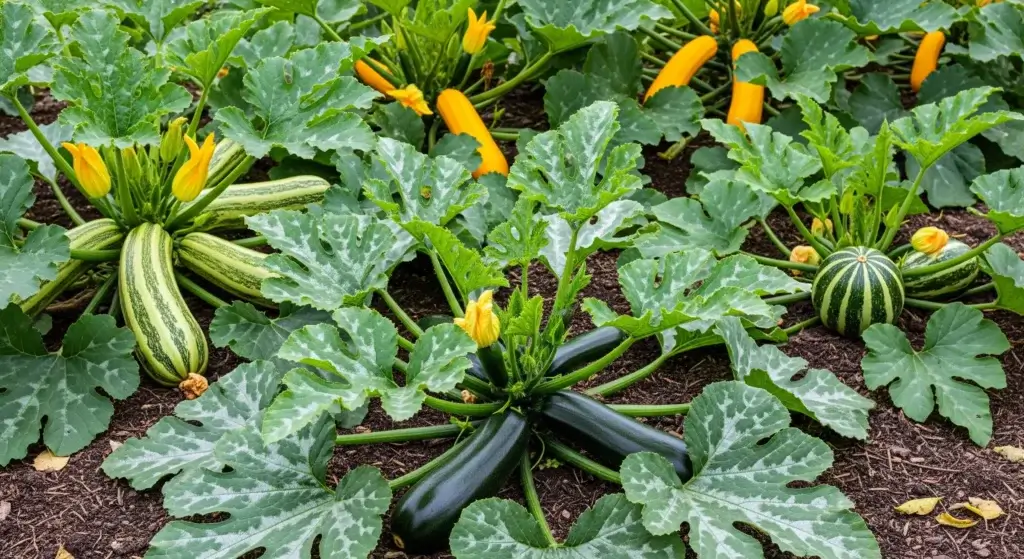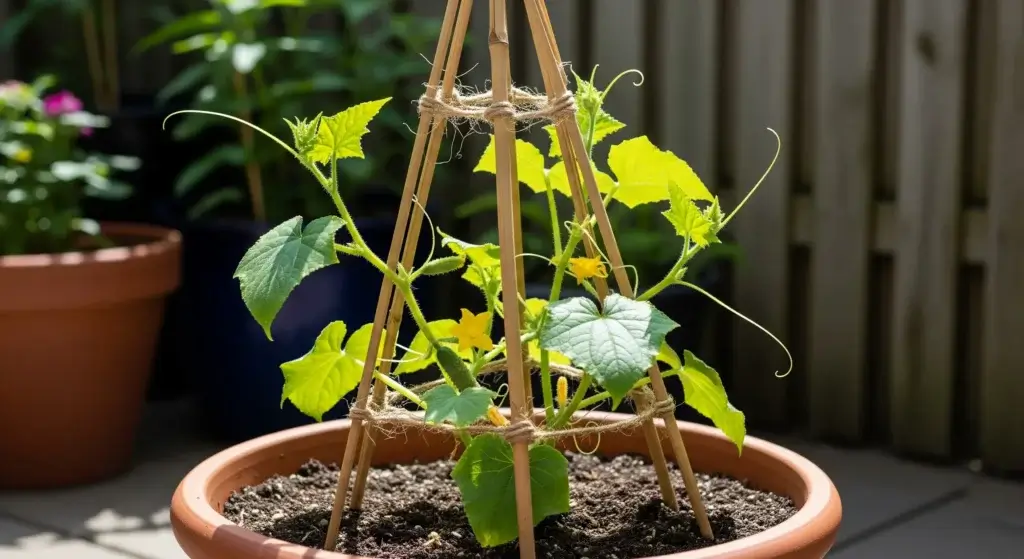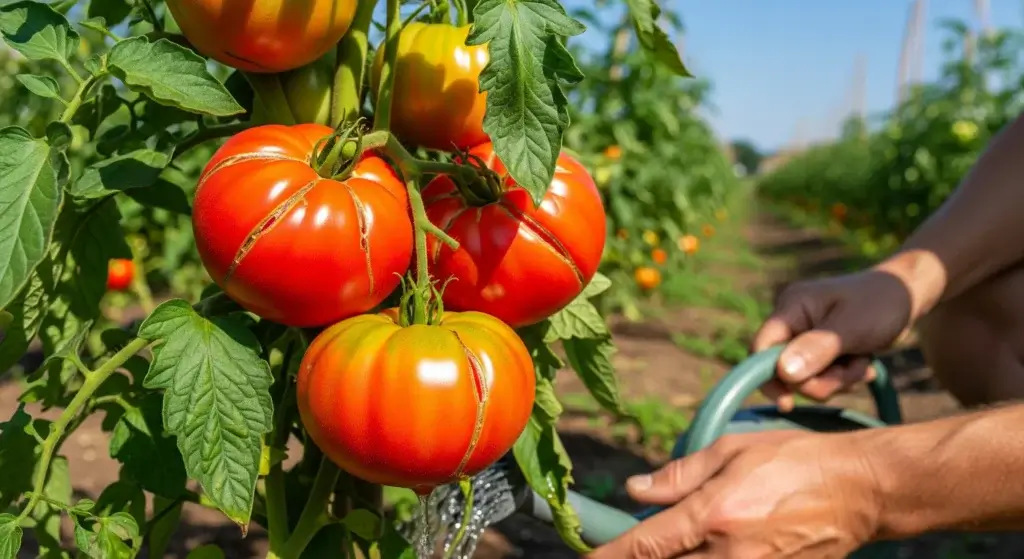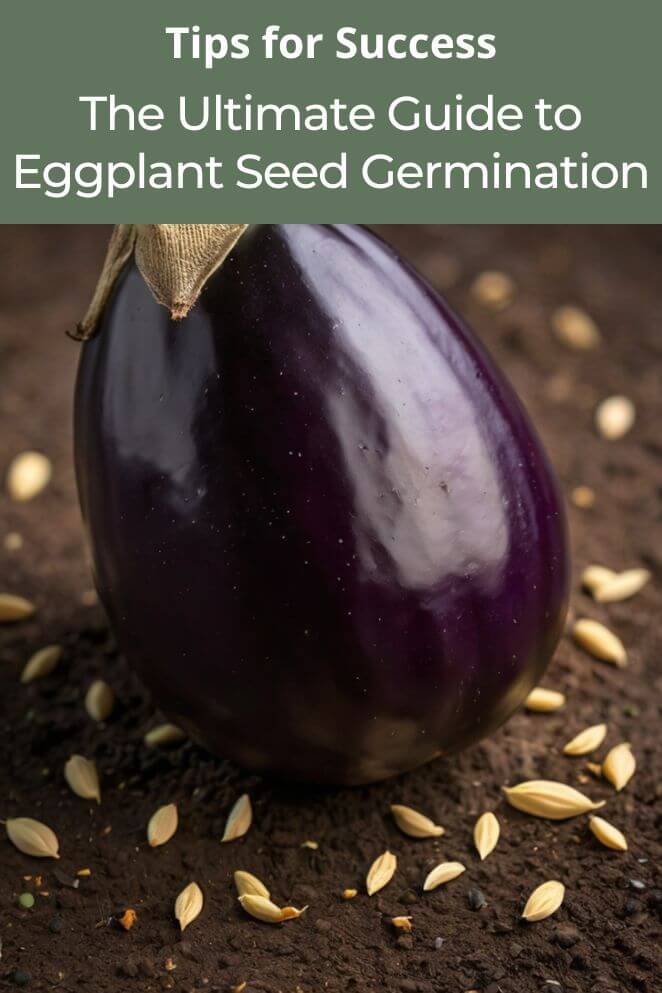
Growing eggplant (also known as aubergine) from seed can be incredibly rewarding.
While it may take some time and patience, the process is relatively simple if you understand the key steps.
Whether you’re a seasoned gardener or just getting started, learning how to germinate eggplant seeds is a vital skill that can help you grow healthier plants with higher yields.
In this guide, we’ll cover everything you need to know about eggplant seed germination—from choosing the right seeds to creating the perfect environment for growth, avoiding common mistakes, and caring for your seedlings after germination.
Types of Eggplant Seeds
There are many varieties of eggplant seeds available, and each type has unique characteristics.
Before you start germinating, it’s important to choose the right seed variety for your garden.
- Globe eggplant: Common in North America, this variety has large, dark purple fruits.
- Asian eggplant: These varieties are long and slender, with thinner skins and milder flavors. They can range in color from deep purple to white.
- Italian eggplant: Similar to the globe variety but slightly smaller, with a rich, robust flavor.
- White eggplant: As the name suggests, these eggplants are white in color and often smaller than their purple counterparts.
Each of these varieties has similar germination requirements, so no matter which type you choose, the following steps will apply.
Preparation for Germination
Before you begin germinating your eggplant seeds, there are a few things you’ll need to consider to set yourself up for success.
Choosing the right germination method
There are several ways to germinate eggplant seeds, and the best method depends on your preferences and available resources.
Paper towel method
This method is simple and efficient.
It involves placing the seeds between damp paper towels and sealing them in a plastic bag.
Keep the bag in a warm place, and you can easily monitor the seeds as they germinate.
This method is space-saving and allows you to see the seeds sprout before transferring them to soil.
- Read also: Organic Eggplant Care: Growing Healthy, Chemical-Free Eggplants
- Read also: Eggplant Soil pH: Understanding pH for Optimal Growth
Seedling trays
Using seedling trays or small pots filled with a germination medium is a more traditional approach.
This method allows the seedlings to develop in a controlled environment, making it easier to manage their growth.
Once the seedlings are strong enough, you can transplant them directly into your garden or larger pots.
Direct sowing
If you live in a warmer climate, you might consider sowing eggplant seeds directly into garden beds.
While this method is less common due to the plant’s need for consistent warmth, it can be a viable option if the weather is right.
Just ensure that the soil temperature is warm enough to support germination.

Preparing the Germination Medium
Choosing the right germination medium is essential for the success of your eggplant seeds.
A good medium will ensure that the seeds have the right conditions to sprout and grow.
Here are two excellent options:
Soil
A high-quality seed-starting mix is a great choice for germinating eggplant seeds.
These mixes are lightweight and designed to provide good drainage, which is important for preventing seed rot and promoting healthy growth.
Coco coir
If you prefer a more sustainable option, coco coir is an excellent alternative.
Made from the fibers of coconut husks, it’s a renewable growing medium that offers excellent aeration and moisture retention.
This helps create an ideal environment for root development.
Creating the Ideal Germination Environment
Eggplant seeds require specific conditions for successful germination, including the right temperature, humidity, and light.
Temperature
Eggplant seeds thrive in warm conditions.
The ideal temperature for germination is between 75°F and 85°F (24°C to 29°C).
If you’re starting seeds indoors, using a seedling heat mat can help maintain these temperatures, especially in cooler climates.
Humidity
Keeping the germination medium moist is essential but be careful not to overwater.
You can cover seed trays with a plastic dome or plastic wrap to help retain humidity.
Just remember to remove the cover once the seeds begin to sprout to prevent excess moisture.
Light
After your seeds have germinated, they will need plenty of light to grow strong and healthy.
Aim for 12 to 16 hours of light each day.
If natural sunlight isn’t enough, consider using a grow light to provide the necessary brightness.
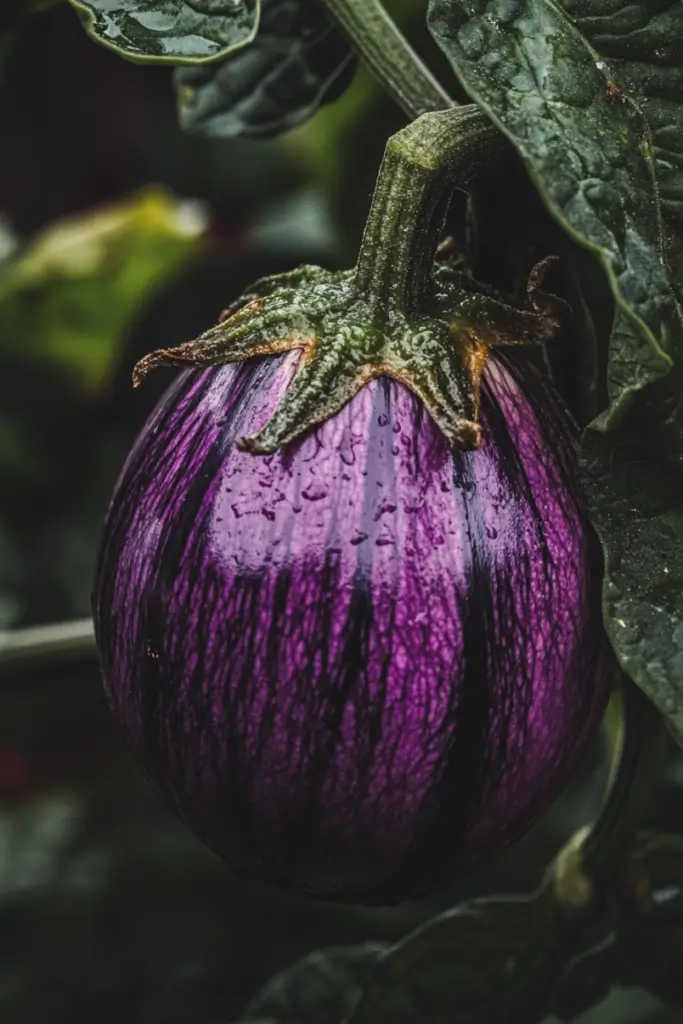
Step-by-Step Guide to Germinating Eggplant Seeds
Germinating eggplant seeds is a straightforward process that can lead to a bountiful harvest.
Here’s a detailed guide to help you successfully sprout your seeds:
Soak the seeds (optional)
Before planting, some gardeners choose to soak their eggplant seeds in warm water for about 6 to 12 hours.
This step isn’t mandatory, but it can help speed up germination.
Soaking softens the seed coat, allowing water to penetrate more easily and kickstart the germination process.
Prepare the containers
Use seedling trays or small pots to create a suitable environment for your seeds.
Fill them with a moistened germination medium, ensuring it’s well-draining.
The medium should hold enough moisture to support seed growth without becoming soggy.
A quality seed-starting mix or coco coir works well for this.
Plant the seeds
Plant the seeds about 1/4 inch deep into the germination medium.
If you’re trying the paper towel method, place the seeds on a damp paper towel and cover them with another moist towel.
This method allows you to monitor the seeds easily and keeps them in a controlled environment.
Provide warmth
Eggplant seeds love warmth! Position the trays or pots in a warm area of your home, or use a heat mat to maintain the ideal temperature range of 75°F to 85°F (24°C to 29°C).
If you’re using the paper towel method, place the bag in a warm, dark place to encourage germination.
Monitor moisture
Keeping the germination medium moist is essential for successful sprouting.
Mist the medium with water as needed to maintain moisture levels.
If you’re using the paper towel method, check the towels regularly to ensure they remain damp but not soaking wet.
Wait for germination
Patience is key!
Eggplant seeds typically take about 7 to 14 days to germinate, depending on the conditions.
Once you see the seedlings breaking through the surface, it’s important to remove any plastic covering to prevent damping-off disease, which can occur in overly moist conditions.
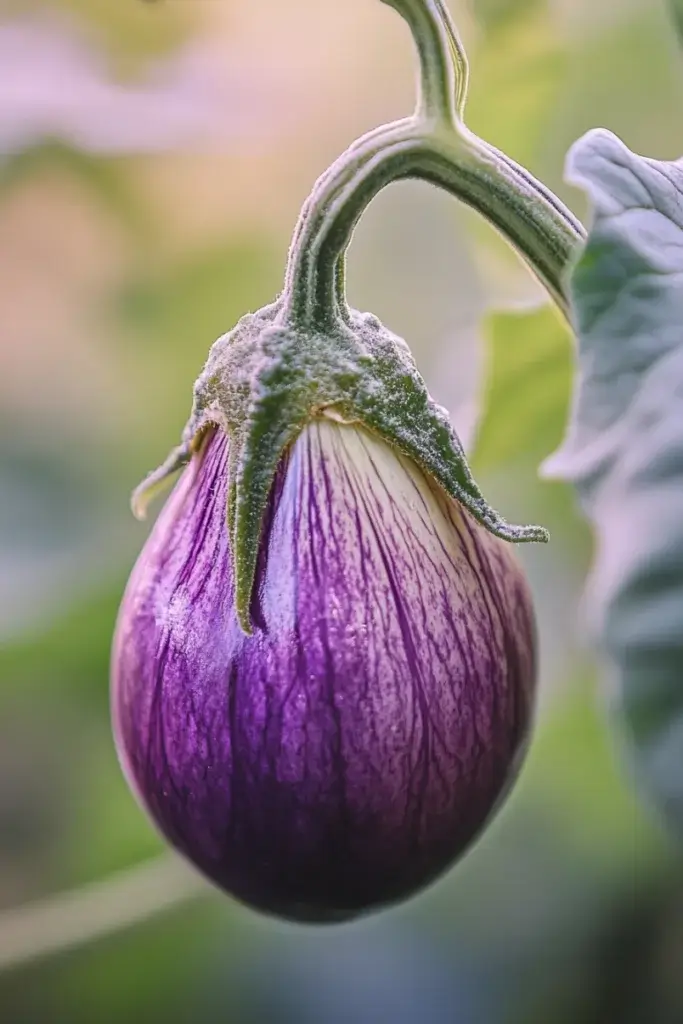
Common Mistakes to Avoid
When it comes to germinating eggplant seeds, there are a few common pitfalls that can hinder your success.
Here’s what to watch out for:
Overwatering
While eggplant seeds do need moisture to germinate, too much water can be detrimental.
Overwatering can lead to rotting seeds or fungal problems, which can ruin your chances of a successful crop.
Instead, aim to keep the soil consistently moist but not soggy.
A good practice is to check the moisture level regularly; if the top of the soil feels dry, it’s time to give it a gentle misting.
Planting too deep
Planting seeds too deep can prevent them from sprouting effectively.
Eggplant seeds should be planted at a depth of about 1/4 inch.
If they are buried deeper than this, they may struggle to break through the soil, leading to poor germination rates.
Stick to the recommended depth to give your seeds the best chance of growing.
Inconsistent temperatures
Eggplants thrive in warm conditions, so temperature consistency is vital for successful germination.
They are sensitive to cold, and if the temperature drops below 70°F (21°C), germination can be delayed or may even fail entirely.
Using a heat mat or placing the trays in a warm area can help maintain the right temperature range, ensuring your seeds have the warmth they need to sprout.
Signs of Successful Germination
Once your eggplant seeds have germinated, you’ll begin to see some exciting signs of growth:
Emerging shoots
Look for small green shoots breaking through the soil or paper towel.
This indicates that your seeds have successfully germinated and are beginning to grow.
Cotyledons
Healthy seedlings will develop two small leaves called cotyledons.
These initial leaves are essential for the plant’s early growth, as they help gather sunlight and nutrients.
As the seedlings mature, these cotyledons will grow larger, providing the energy the plant needs to thrive.
True leaves
After a few days, you should start to see true leaves appearing.
These are the leaves that will grow in the plant’s natural shape and are crucial for its continued growth and development.
The presence of true leaves signals that your eggplant plant is ready to move on to the next stage, such as being transplanted into larger pots or into the garden.

Caring for Seedlings
After your eggplant seeds have germinated, it’s time to focus on caring for the young seedlings.
This stage is critical for ensuring the plants are healthy and strong before they’re transplanted to their final location.
Transplanting seedlings to larger pots or garden beds
When your seedlings have developed two to three true leaves, they’re ready for a new home.
If you’re moving them outdoors, check that the weather is warm enough—eggplants don’t like the cold, and temperatures below 55°F (13°C) can slow their growth.
Choose a sunny spot in your garden, or use larger pots filled with nutrient-rich soil.
Providing adequate water, sunlight, and nutrients
- Water: Keep the soil consistently moist, but avoid overwatering, which can cause root rot.
- Sunlight: Make sure the seedlings receive at least 6-8 hours of direct sunlight per day or continue using a grow light.
- Nutrients: Once transplanted, feed your eggplant seedlings with a balanced, organic fertilizer every 2-3 weeks to support healthy growth.
Protecting seedlings from pests and diseases
Eggplant seedlings can be attractive targets for pests like aphids and flea beetles.
To protect your plants, consider using organic pest control methods, such as neem oil, which is safe and effective.
You can also introduce beneficial insects, like ladybugs, which feed on harmful pests and help keep your seedlings healthy.
- Read also: Maximizing Your Harvest: Essential Eggplant Pruning Tips
- Read also: The Perfect Pair: Companion Planting Guides for Eggplant
Final Thoughts
Eggplant seed germination might take some patience, but the results are well worth the effort.
By providing the right conditions—temperature, moisture, and light—you can ensure that your seeds germinate successfully and develop into healthy plants.
With careful attention to detail during the germination and seedling stages, you’ll be well on your way to enjoying a bountiful eggplant harvest.
FAQs
Eggplant seeds typically take 7 to 14 days to germinate, depending on the temperature and growing conditions.
It’s possible, but eggplant seeds require consistent warmth, so it’s often better to start seeds indoors and transplant them once the weather is warm.
Common reasons for poor germination include low temperatures, overwatering, or old seeds. Ensure the temperature is between 75°F and 85°F, and that the soil is moist but not waterlogged.

